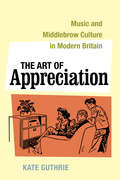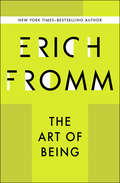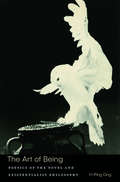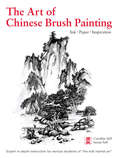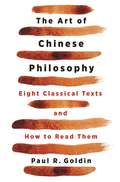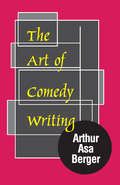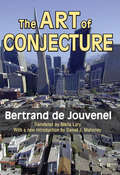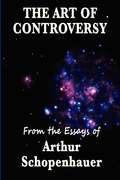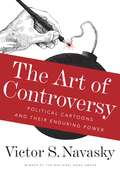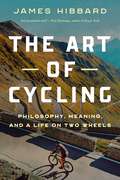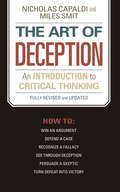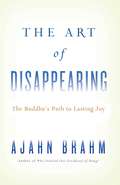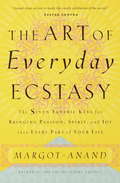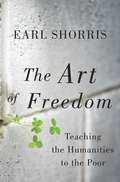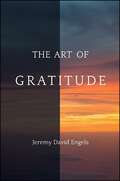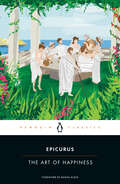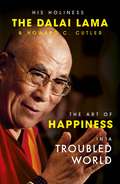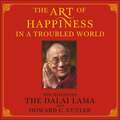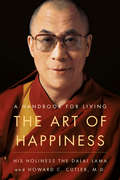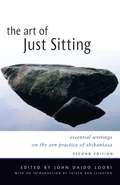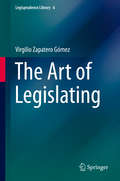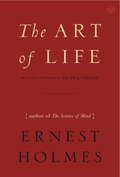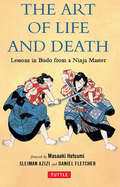- Table View
- List View
The Art of Appreciation: Music and Middlebrow Culture in Modern Britain (California Studies in 20th-Century Music #30)
by Kate GuthrieFrom the BBC Proms to Bernstein's Young People's Concerts, initiatives to promote classical music have been a pervasive feature of twentieth-century musical life. The goal of these initiatives was rarely just to reach a larger and more diverse audience but to teach a particular way of listening that would help the public "appreciate" music. This book examines for the first time how and why music appreciation has had such a defining and long-lasting impact—well beyond its roots in late-Victorian liberalism. It traces the networks of music educators, philanthropists, policy makers, critics, composers, and musicians who, rather than resisting new mass media, sought to harness their pedagogic potential. The book explores how listening became embroiled in a nexus of modern problems around citizenship, leisure, and education. In so doing, it ultimately reveals how a new cultural milieu—the middlebrow—emerged at the heart of Britain's experience of modernity.
The Art of Being
by Erich FrommA guide to well-being from the renowned social psychologist and New York Times–bestselling author of The Art of Loving and Escape from Freedom. Though laptops, smartphones, and TVs have in many ways made life more convenient, they have also disconnected us from the real world. Days are spent going from screen to machine, machine to screen. In The Art of Being, renowned humanist philosopher and psychoanalyst Erich Fromm draws from sources as varied as Sigmund Freud, Buddha, and Karl Marx to find a new, centered path to self-knowledge and well-being. In order to truly live, Fromm argues, we must first understand our purpose, and the places where we lost it. This ebook features an illustrated biography of Erich Fromm including rare images and never-before-seen documents from the author&’s estate.
The Art of Being: Poetics of the Novel and Existentialists Philosophy
by Yi-Ping OngIn this account of how the novel reorients philosophy toward the meaning of existence, Yi-Ping Ong shows that the existentialists discovered a radical way of thinking about the relation between the form of the novel and the nature of self-knowledge, freedom, and the world. At stake are the conditions under which knowledge of existence is possible.
The Art of Chinese Brush Painting
by Caroline Self Susan SelfChinese ink painting is an offshoot of calligraphy and is a beautiful and reflective art that's been revered in China for centuries. A wonderfully creative tool, this book is an excellent way for newcomers to experience this ancient art form.Traditional black-and-white Chinese ink painting elements, along with the tradition's essentials--such as the quality and variety of the tools and accessories used in its practice are all covered. The Art of Chinese Brush Painting encourages readers to be mindful of the principles of composition and perspective, and introduces specific techniques for several different elements, including Chinese Zodiac animals and landscapes.
The Art of Chinese Brush Painting
by Caroline Self Susan SelfChinese ink painting is an offshoot of calligraphy and is a beautiful and reflective art that's been revered in China for centuries. A wonderfully creative tool, this book is an excellent way for newcomers to experience this ancient art form.Traditional black-and-white Chinese ink painting elements, along with the tradition's essentials--such as the quality and variety of the tools and accessories used in its practice are all covered. The Art of Chinese Brush Painting encourages readers to be mindful of the principles of composition and perspective, and introduces specific techniques for several different elements, including Chinese Zodiac animals and landscapes.
The Art of Chinese Philosophy: Eight Classical Texts and How to Read Them
by Paul GoldinA smart and accessible introduction to the most important works of ancient Chinese philosophy—the Analects of Confucius, Mozi, Mencius, Laozi, Zhuangzi, Sunzi, Xunzi, and Han FeiziThis book provides an unmatched introduction to eight of the most important works of classical Chinese philosophy—the Analects of Confucius, Mozi, Mencius, Laozi, Zhuangzi, Sunzi, Xunzi, and Han Feizi. Combining accessibility with the latest scholarship, Paul Goldin, one of the world's leading authorities on the history of Chinese philosophy, places these works in rich context as he explains the origin and meaning of their compelling ideas.Because none of these classics was written in its current form by the author to whom it is attributed, the book begins by asking, "What are we reading?" and showing that understanding the textual history of the works enriches our appreciation of them. A chapter is devoted to each of the eight works, and the chapters are organized into three sections: "Philosophy of Heaven," which looks at how the Analects, Mozi, and Mencius discuss, often skeptically, Heaven (tian) as a source of philosophical values; "Philosophy of the Way," which addresses how Laozi, Zhuangzi, and Sunzi introduce the new concept of the Way (dao) to transcend the older paradigms; and "Two Titans at the End of an Age," which examines how Xunzi and Han Feizi adapt the best ideas of the earlier thinkers for a coming imperial age.In addition, the book presents clear and insightful explanations of the protean and frequently misunderstood concept of qi—and of a crucial characteristic of Chinese philosophy, nondeductive reasoning. The result is an invaluable account of an endlessly fascinating and influential philosophical tradition.
The Art of Comedy Writing
by Arthur Asa BergerJust as a distinctive literary voice or style is marked by the ease with which it can be parodied, so too can specific aspects of humor be unique. Playwrights, television writers, novelists, cartoonists, and film scriptwriters use many special technical devices to create humor. Just as dramatic writers and novelists use specific devices to craft their work, creators of humorous materials from the ancient Greeks to today's stand-up comics have continued to use certain techniques in order to generate humor.In The Art of Comedy Writing, Arthur Asa Berger argues that there are a relatively limited number of techniques forty-five in all that humorists employ. Elaborating upon his prior, in-depth study of humor, An Anatomy of Humor, in which Berger provides a content analysis of humor in all forms joke books, plays, comic books, novels, short stories, comic verse, and essaysThe Art of Comedy Writing goes further. Berger groups each technique into four basic categories: humor involving identity such as burlesque, caricature, mimicry, and stereotype; humor involving logic such as analogy, comparison, and reversal; humor involving language such as puns, wordplay, sarcasm, and satire; and finally, chase, slapstick, and speed, or humor involving action.Berger claims that if you want to know how writers or comedians create humor study and analysis of their humorous works can be immensely insightful. This book is a unique analytical offering for those interested in humor. It provides writers and critics with a sizable repertoire of techniques for use in their own future comic creations. As such, this book will be of interest to people inspired by humor and the creative process professionals in the comedy field and students of creative writing, comedy, literary humor, communications, broadcast/media, and the humanities.
The Art of Comics: A Philosophical Approach (New Directions in Aesthetics #32)
by Roy T. Cook Aaron MeskinThe Art of Comics is the first-ever collection of essays published in English devoted to the philosophical topics raised by comics and graphic novels. In an area of growing philosophical interest, this volume constitutes a great leap forward in the development of this fast expanding field, and makes a powerful contribution to the philosophy of art. The first-ever anthology to address the philosophical issues raised by the art of comics Provides an extensive and thorough introduction to the field, and to comics more generally Responds to the increasing philosophical interest in comic art Includes a preface by the renowned comics author Warren Ellis Many of the chapters are illustrated, and the book carries a stunning cover by the rising young comics star David Heatley
The Art of Conjecture
by Bertrand de JouvenelCommissions of experts regularly meet to reply to questions such as: What will be the population of the country, or even of our planet, in ten, fifteen or twenty-five years? In what proportion will production have increased, what modifications will its composition and utilizations have undergone? The attraction of efforts to forecast the future continues. That is a fact. How does it proceed? That is a problem, one on which de Jouvenel focuses on in this book.The Art of Conjecture clearly explains what the "study of the future" can mean. De Jouvenel emphasizes the logical and political problems of forecasting and discusses methods in economics, sociology, and political science by which the future can be studied. More importantly, he discusses the fallacies to which the "study of the future" is peculiarly likely to give rise. The author argues that it is natural and necessary for the population to have visions of the future. Without this, he states, we would only be able to set one opinion of the future against another. If the origins and meanings of these predictions remained obscure, only the event could decide among the opinions.If any man can be said to have created the serious "study of the future" in our time, it is Bertrand de Jouvenel. Futuribles, a periodical he created, continues to represent a major turning point in contemporary social science. Jouvenel aimed to show how "the art of conjecture" could inform prudential judgment and allow citizens and statesmen to detect troubles before they arise.
The Art of Controversy
by Arthur SchopenhauerCollected here are six short essays-- The Basis of All Dialect; Stratagems; On the Comparative Place of Interest and Beauty in Works of Art; Psychological Observations; and On the Wisdom of Life: Aphorisms, and Genius and Virtue-- by the world renowned philosopher Arthur Schopenhauer.
The Art of Controversy: Political Cartoons and Their Enduring Power
by Victor S. NavaskyA lavishly illustrated, witty, and original look at the awesome power of the political cartoon throughout history to enrage, provoke, and amuse. As a former editor of The New York Times Magazine and the longtime editor of The Nation, Victor S. Navasky knows just how transformative--and incendiary--cartoons can be. Here Navasky guides readers through some of the greatest cartoons ever created, including those by George Grosz, David Levine, Herblock, Honoré Daumier, and Ralph Steadman. He recounts how cartoonists and caricaturists have been censored, threatened, incarcerated, and even murdered for their art, and asks what makes this art form, too often dismissed as trivial, so uniquely poised to affect our minds and our hearts.Drawing on his own encounters with would-be censors, interviews with cartoonists, and historical archives from cartoon museums across the globe, Navasky examines the political cartoon as both art and polemic over the centuries. We see afresh images most celebrated for their artistic merit (Picasso's Guernica, Goya's "Duendecitos"), images that provoked outrage (the 2008 Barry Blitt New Yorker cover, which depicted the Obamas as a Muslim and a Black Power militant fist-bumping in the Oval Office), and those that have dictated public discourse (Herblock's defining portraits of McCarthyism, the Nazi periodical Der Stürmer's anti-Semitic caricatures). Navasky ties together these and other superlative genre examples to reveal how political cartoons have been not only capturing the zeitgeist throughout history but shaping it as well--and how the most powerful cartoons retain the ability to shock, gall, and inspire long after their creation.Here Victor S. Navasky brilliantly illuminates the true power of one of our most enduringly vital forms of artistic expression.
The Art of Cycling: Philosophy, Meaning, And A Life On Two Wheels
by James HibbardA meditative love letter to the sport of cycling, revealing how cycling can shed new light on age-old questions of selfhood, meaning, and purpose.Interweaving cycling, philosophy, and personal narrative, The Art of Cycling provides readers with a deep understanding of the highs and lows of being an elite athlete, the limits of approaching any sporting pursuit from a strictly rational perspective, and how the philosophical and often counterintuitive lessons derived from sport can be applied to other areas of life. Accessible to everyone from the hardened racer to the casual fan, this updated American edition of The Art of Cycling engages the history of thought through the lens of cycling to undermine much of what is typically thought of as "intellectual," breathing new vitality into life, and countering society's obsession with progress and drive towards the abstract, detached, and virtual.
The Art of Deception: An Introduction to Critical Thinking.
by Nicholas Capaldi Miles SmitThis classic work on critical thinking-now fully updated and revised-uses a novel approach to teach the basics of informal logic. On the assumption that it takes one to know one, the authors have written the book from the point of view of someone who wishes to deceive, mislead, or manipulate others. Having mastered the art of deception, readers will then be able to detect the misuse or abuse of logic when they encounter it in others-whether in a heated political debate or while trying to evaluate the claims of a persuasive sales person. Using a host of real-world examples, the authors show you how to win an argument, defend a case, recognize a fallacy, see through deception, persuade a skeptic, and turn defeat into victory. Not only do they discuss the fundamentals of logic (premises, conclusions, syllogisms, common fallacies, etc. ), but they also consider important related issues often encountered in face-to-face debates, such as gaining a sympathetic audience, responding to audience reaction, using nonverbal devices, clearly presenting the facts, refutation, and driving home a concluding argument. Whether you're preparing for law school or you just want to become more adept at making your points and analyzing others' arguments, The Art of Deception will give you the intellectual tools to become a more effective thinker and speaker. Helpful exercises and discussion questions are also included. Nicholas Capaldi, Ph. D. (Baton Rouge, LA), holds the Legendre-Soulé Distinguished Scholar Chair in Business Ethics at Loyola University of New Orleans. He is the author or editor of many books including Affirmative Action: Social Justice or Unfair Preference?; Immigration: Debating the Issues; and John Stuart Mill: A Biography. Miles Smit, Ph. D. (Toronto, Ontario), works as a business analyst in Canada and holds a Ph. D. in philosophy from the Catholic University of Leuven, Belgium.
The Art of Disappearing
by Ajahn BrahmWhether mere bumps in the road or genuine crises, we live in a world of unwanted events that no willpower can prevent. In The Art of Disappearing, Ajahn Brahm helps us learn to abandon the headwind of false expectations and follow instead the Buddha's path of understanding. Releasing our attachment to past and future, to self and other, we can directly experience the natural state of serenity underlying all our thoughts and discover the bliss of the present moment. In that space, we learn what it is to disappear. Ajahn Brahm, an unparalleled guide to the bliss of meditation, makes the journey as fun as it is rewarding. The Art of Disappearing, comprised of a series of teachings Ajahn Brahm gave to the monks of Bodhinyana Monastery, where he serves as abbot, offers a unique glimpse into the mind of one of contemporary Buddhism's most engaging figures.
The Art of Everyday Ecstasy
by Margot Anand"Ecstasy is about waking up and finding that you are in love with life."Most people think of ecstasy in terms of sexual ecstasy, which Tantric sex expert Margot Anand wrote about in her bestselling The Art of Sexual Ecstasy. Now, in The Art of Everyday Ecstasy, Anand expands our definition of ecstasy and shows how we can harness its energy to help us live, work, and love more passionately, joyfully, and with true spiritual focus. Our modern, work-obsessed, stress-filled culture--what Anand calls the "anti-ecstatic conspiracy"--has dulled our spirits, thrown us off balance, and alienated us from meaningful everyday experiences. In this inspirational journey toward finding the healing nature of ecstasy, Anand explains how the two types of ecstatic experiences--the moments of epiphany called Ecstatic Awakenings, and EveryDay Ecstasy, or the Ecstasy of Flow, a connection to our power and inner wisdom--can help us move beyond pain and doubt to reach our highest potential.Based on the spiritual path of Tantra, Anand shows how to use the natural energy system of our bodies--the seven chakras--as a map to ecstasy. As she guides us through the chakras, she explains how each one plays an important role in transforming energy into erotic passion, healing, empowerment, compassion, creativity, insight, and gratitude. Blocked chakras manifest themselves in surprising ways; wholeness can be achieved only when all of the chakras are open with energy flowing freely. By transforming negative behavioral patterns into positive ones and strengthening ourselves physically, emotionally, and spiritually, we can improve our health, sex life, career, relationships, and find profound meaning in everyday moments.With personal anecdotes, exercises, meditations, and rituals, The Art of Everyday Ecstasy shows us how to bring ecstatic energy into the body, mind, heart, and spirit--"to embrace every moment in our totality, to respond bodily, feel from the heart, perceive with clarity, and be fully present to others and to life."
The Art of Freedom: Teaching the Humanities to the Poor
by Earl ShorrisA conversation in a prison cell sparks an ambitious undertaking to attack the roots of long-term poverty. Seeking answers to the toughest questions about poverty in the United States, Earl Shorris had looked everywhere. At last, one resounding answer came from a conversation with a woman in a maximum-security prison: the difference between rich and poor is the humanities. Shorris took that idea and started a course at the Clemente Family Guidance Center in New York. With a faculty of friends, he began teaching the great works of literature and philosophy--from Plato to Kant, from Cervantes to Garcia Marquez--at the college level to dropouts, immigrants, and ex-prisoners. From that first class came two dentists, a nurse, two PhDs, a fashion designer, a drug counselor, and other successes. Over the course of seventeen years the course expanded to many U.S. cities and foreign countries. Now Earl Shorris has written the stories of those who teach and those who study the humanities--a tribute to the courage of people rising from unspeakable poverty to engage in dialogue with professors from great universities around the world. This year, in a high school on the South Side of Chicago, a Clemente Course has begun that may change the character of public education in America and perhaps the world.
The Art of Gratitude
by Jeremy David EngelsIn The Art of Gratitude, Jeremy David Engels sketches a genealogy of gratitude from the ancient Greeks to the contemporary self-help movement. One of the most striking things about gratitude, Engels finds, is how consistently it is described using the language of indebtedness. A chief purpose of this, he contends, is to make us more comfortable living lives in debt, with the nefarious effect of pacifying the citizenry so we are less likely to speak out about social and economic injustice. To counteract this, he proposes an alternative art of gratitude-as-thanksgiving that is inspired by Indian philosophy, particularly the yoga philosophy of the Bhagavad Gita and Patanjali's Yoga-Sutras. He argues that this art of gratitude can challenge neoliberalism by reorienting our politics away from resentment, anger, and guilt and toward a democratic ethic of thanksgiving and the common good.
The Art of Happiness
by EpicurusNew to Penguin Classics and the perfect companion volume to bestselling author Daniel Klein's new book, Travels with Epicurus The teachings of Epicurus—about life and death, religion and science, physical sensation, happiness, morality, and friendship—attracted legions of adherents throughout the ancient Mediterranean world and deeply influenced later European thought. Though Epicurus faced hostile opposition for centuries after his death, he counts among his many admirers Thomas Hobbes, Thomas Jefferson, Karl Marx, and Isaac Newton. This volume includes all of his extant writings—his letters, doctrines, and Vatican sayings—alongside parallel passages from the greatest exponent of his philosophy, Lucretius, extracts from Diogenes Laertius' Life of Epicurus, a lucid introductory essay about Epicurean philosophy, and a foreword by Daniel Klein, author of Travels with Epicurus and coauthor of the New York Times bestseller Plato and a Platypus Walk into a Bar. .
The Art of Happiness in a Troubled World
by Dalai Lama The Dalai Lama Howard C. CutlerFollowing on from the internationally bestselling The Art of Happiness, the Dalai Lama and Howard Cutler bring us the inspiring The Art of Happiness in a Troubled World.This inspirational book brings the successful East-meets-West pairing together again to provide a practical application of Tibetan Buddhist spiritual values to the fast-paced, unpredictable, stressful and demanding world we all live in today.In this wise, insightful and practical book, the Dalai Lama shows us how to follow the path that will lead us to fulfilment, purpose and happiness, even in our troubled modern times.
The Art of Happiness in a Troubled World
by Dalai Lama The Dalai Lama Howard C. CutlerFollowing on from the internationally bestselling The Art of Happiness, the Dalai Lama and Howard Cutler bring us the inspiring The Art of Happiness in a Troubled World.This inspirational book brings the successful East-meets-West pairing together again to provide a practical application of Tibetan Buddhist spiritual values to the fast-paced, unpredictable, stressful and demanding world we all live in today.In this wise, insightful and practical book, the Dalai Lama shows us how to follow the path that will lead us to fulfilment, purpose and happiness, even in our troubled modern times.(P)2019 Hodder & Stoughton Limited
The Art of Happiness, 10th Anniversary Edition: A Handbook for Living
by Dalai LamaAn updated edition of a beloved classic, the original book on happiness, with new material from His Holiness the Dalai Lama and Dr. Howard Cutler. Nearly every time you see him, he?s laughing, or at least smiling. And he makes everyone else around him feel like smiling. He?s the Dalai Lama, the spiritual and temporal leader of Tibet, a Nobel Prize winner, and a hugely sought-after speaker and statesman. Why is he so popular? Even after spending only a few minutes in his presence you can?t help feeling happier. If you ask him if he?s happy, even though he?s suffered the loss of his country, the Dalai Lama will give you an unconditional yes. What?s more, he?ll tell you that happiness is the purpose of life, and that ?the very motion of our life is toward happiness.? How to get there has always been the question. He?s tried to answer it before, but he?s never had the help of a psychiatrist to get the message across in a context we can easily understand. The Art of Happiness is the book that started the genre of happiness books, and it remains the cornerstone of the field of positive psychology. Through conversations, stories, and meditations, the Dalai Lama shows us how to defeat day-to-day anxiety, insecurity, anger, and discouragement. Together with Dr. Howard Cutler, he explores many facets of everyday life, including relationships, loss, and the pursuit of wealth, to illustrate how to ride through life?s obstacles on a deep and abiding source of inner peace. Based on 2,500 years of Buddhist meditations mixed with a healthy dose of common sense, The Art of Happiness is a book that crosses the boundaries of traditions to help readers with difficulties common to all human beings. After being in print for ten years, this book has touched countless lives and uplifted spirits around the world.
The Art of Just Sitting
by John Daido Loori Taigen Dan LeightonShikantaza--or "just sitting"--is one of the simplest, most subtle forms of meditation, and one of the most easily misunderstood. This peerless volume brings together a wealth of writings, from the Buddha himself to Bodhidharma and Dogen and many of modern Zen Buddhism's most influential masters, all pointing directly to the heart of this powerful practice. Edited by one of America's pre-eminent Zen teachers, this book is a rich resource for wisdom seekers and scholars alike.
The Art of Legislating (Legisprudence Library #6)
by Virgilio Zapatero GómezAny contemporary state presents itself as committed to the “rule of law”, and this notion is perhaps the most powerful political ideal within the current global discourse on legal and political institutions. Despite being a contested concept, the rule of law is generally recognised as meaning that government is bound in all its actions by fixed and public rules, and that these rules respect certain formal requirements and are enforced by an independent judiciary. This book focuses on formal legality and the question of how to achieve good laws—a topic that was famously addressed by the 18th century enlightened thinkers, but also by prominent legal scholars of our time. Historically, the canon of “good legislation” demanded generality, publicity and accessibility, and comprehensibility of laws; non-retroactivity; consistency; the possibility of complying with legal obligations and prohibitions; stability; and congruency between enacted laws and their application. All these are valuable ideals that should not be abandoned in today’s legal systems, particularly in view of the silent revolution that is transforming our legality-based “states of law” into jurisdictional states. Such ideals are still worth pursuing for those who believe in representative democracy, in the rule of law and in the dignity of legislation. The idea for the book stemmed from the author’s parliamentary and governmental experience; he was responsible for the Government of Spain’s legislative co-ordination from 1982 to 1993, which were years of intensive legislative production. The more than five hundred laws (and thousands of decrees) elaborated in this period profoundly changed all sectors of the legal order inherited from Franco’s dictatorship, and laid the foundations of a new social and democratic system. For an academic, this was an exciting experience, which offered a unique opportunity to put the theory of legislation to the test. Reflecting and elaborating on this experience, the book not only increases scholarly awareness of how laws are made, but above all, improves the quality of legislation and as a result the rule of law.
The Art of Life
by Ernest HolmesThe inspiration of Ernest Holmes has reached hundreds of thousands of readers through his classic works, many of which are just now becoming available in paperback. Originally published in the first half of the twentieth century, these meditative, concise volumes have never previously appeared in paperback. Whether a newcomer to the philosophy Holmes founded or a veteran reader, you will find great power and practicality in the words that render Holmes one of the most celebrated and beloved mystical teachers of the past hundred years.
The Art of Life and Death
by Masaaki Hatsumi Daniel Fletcher Sleiman Azizi[Daniel Fletcher and Sleiman Azizi studied ninjutsu under the tutelage of the venerable Masaaki Hatsumi of the Bujinkan Dojo and in The Art of Life and Death, they pay homage to their Sensei by revealing a host of insightful discoveries. As is the tradition in Eastern disciplines, these lessons are conveyed in stories, poetry, art and proverbs. Their words of wisdom about the nature of life and death will provoke thought and perhaps break through certain obstacles in your own life that prevent you from achieving transformation.]There is a Japanese proverb that admonishes a student not to step on the shadow of his teacher. In writing this book, Fletcher and Azizi discovered that no matter how hard they tried to avoid stepping on it, their teacher's shadow was always there-a reminder of his influence on their lives while at the Bujinkan Dojo. And so, while The Art of Life and Death relates their own personal discoveries, it is also a testament to the vitality of the grandmaster and his budo teachings.
